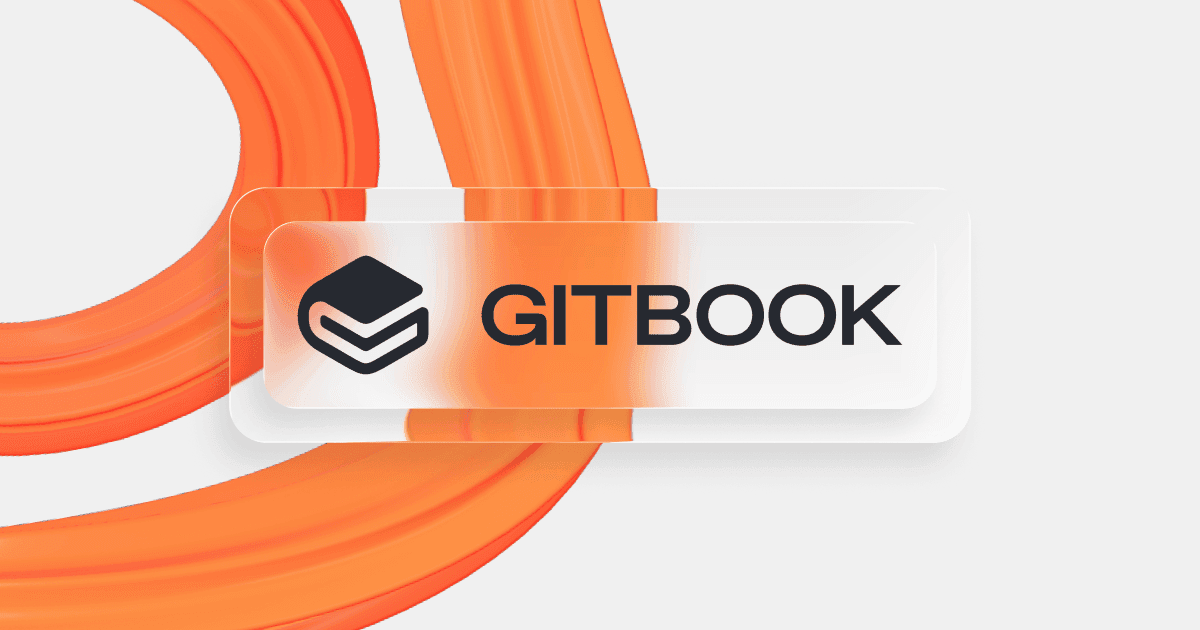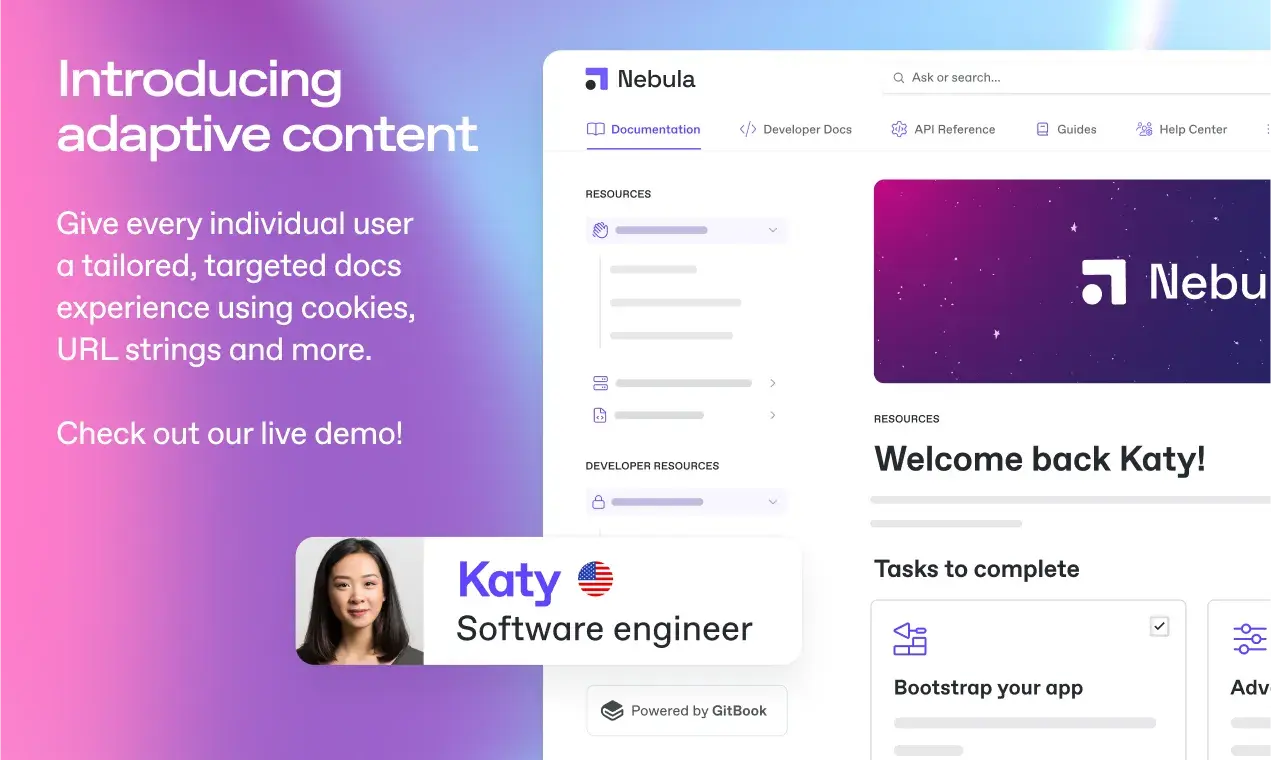
GitBook is the AI-native documentation platform for technical teams. It simplifies knowledge sharing, with docs-as-code support and AI-powered search & insights. Sign up for free!
www.gitbook.com
Table of Contents
Overview
In today’s rapidly evolving digital landscape, static, one-size-fits-all documentation no longer meets the sophisticated needs of modern software organizations. Users increasingly expect personalized, intelligent experiences that adapt to their specific roles, requirements, and contexts. GitBook emerges as a revolutionary documentation platform that fundamentally transforms how technical content is created, delivered, and consumed.Unlike traditional documentation systems that present identical content to every visitor, GitBook introduces dynamic, adaptive documentation that leverages user data, product information, and artificial intelligence to deliver highly personalized experiences. This intelligent approach ensures that each user receives precisely the information they need, when they need it, dramatically improving both user satisfaction and documentation effectiveness.
At its core, GitBook represents a paradigm shift from static “paper map” documentation to dynamic “GPS-powered” documentation that guides users along personalized journeys tailored to their specific goals and contexts. The platform combines cutting-edge AI capabilities with sophisticated personalization engines to create living documents that evolve alongside your products and users.
Key Features
GitBook incorporates advanced capabilities designed to transform documentation from static resources into intelligent, adaptive experiences:- Adaptive Content Personalization: Leverages cookies, URL parameters, user roles, authentication data, and feature flags to dynamically customize documentation content for each individual visitor, ensuring users only see information relevant to their specific subscription level, permissions, and use cases.
- Model Context Protocol (MCP) Integration: Implements Anthropic’s cutting-edge MCP standard to enable the AI Assistant to seamlessly connect with external data sources, internal systems, and third-party APIs, providing enriched, contextually aware responses that draw from comprehensive information ecosystems.
- Advanced AI Assistant: Features a sophisticated artificial intelligence system that goes beyond traditional search functionality to provide personalized, context-aware support directly within documentation interfaces, understanding user intent and delivering intelligent responses based on their specific circumstances and needs.
- Dynamic Feature Flag Support: Automatically shows or hides documentation sections based on active feature flags, enabling seamless coordination between product releases and documentation updates while supporting A/B testing scenarios and gradual feature rollouts.
- Comprehensive Collaboration Suite: Provides robust tools for team-based documentation creation, including version control, real-time editing, content review workflows, publishing management, and integrated feedback systems designed to streamline collaborative documentation processes.
- Computed Content Generation: Automatically creates and updates documentation from existing sources like OpenAPI specifications, reducing manual maintenance overhead while ensuring documentation remains synchronized with actual product capabilities.
- Multi-language Auto-translation: Utilizes AI to automatically translate documentation into multiple languages while maintaining context and technical accuracy, enabling global teams to access content in their preferred languages.
How It Works
GitBook’s intelligent documentation system operates through a sophisticated multi-layered approach that transforms traditional static content into dynamic, personalized experiences. The platform begins by analyzing incoming user data including authentication status, role assignments, subscription levels, geographic location, and behavioral patterns to build comprehensive user profiles.The adaptive content engine then utilizes this user intelligence combined with feature flags, product data, and custom variables to dynamically modify documentation presentation in real-time. This ensures each visitor encounters content specifically tailored to their permissions, subscription tier, and use case requirements, eliminating information overload while maximizing relevance.
The integrated AI Assistant enhances this personalized experience by leveraging the Model Context Protocol to access both internal documentation and external data sources simultaneously. This enables the assistant to provide responses that incorporate not only GitBook content but also real-time information from connected systems, APIs, and databases, delivering comprehensive support that extends beyond traditional documentation boundaries.
The platform’s computed content capabilities automatically generate and maintain documentation from existing sources such as OpenAPI specifications, ensuring technical accuracy while reducing manual maintenance requirements. When source materials change, GitBook automatically updates corresponding documentation sections, maintaining synchronization between product capabilities and user-facing content.
Use Cases
GitBook’s advanced personalization and AI capabilities make it invaluable across diverse organizational contexts and documentation scenarios:- SaaS Platform Documentation: Enables software companies to create intelligent documentation experiences that automatically adapt to user subscription levels, feature access permissions, and role-based requirements, ensuring customers only see relevant functionality while providing seamless upgrade pathways for premium features.
- Internal Knowledge Management: Empowers organizations to build comprehensive internal wikis that personalize content based on employee departments, access levels, and project assignments, creating tailored information experiences that improve productivity and reduce information discovery time.
- Developer Documentation Excellence: Provides development teams with context-aware documentation that adapts to specific technology stacks, API versions, and integration requirements, offering dynamic code examples, personalized troubleshooting guides, and intelligent recommendations based on individual developer contexts.
- Product Documentation Ecosystems: Supports complex product families by delivering personalized user guides, feature explanations, and support resources that adapt to specific product configurations, user expertise levels, and implementation scenarios.
- Educational Content Delivery: Creates adaptive learning experiences that personalize educational content based on user progress, learning preferences, and skill levels, ensuring optimal knowledge transfer and engagement across diverse learner populations.
Pros \& Cons
Advantages
- Revolutionary Personalization Capabilities: Delivers unprecedented levels of documentation customization through intelligent user profiling, dynamic content adaptation, and context-aware personalization that ensures each visitor receives optimally relevant information tailored to their specific needs and circumstances.
- Advanced AI Integration: Features sophisticated artificial intelligence capabilities including the groundbreaking Model Context Protocol integration, enabling documentation that can access external data sources, provide intelligent recommendations, and deliver contextually appropriate support beyond traditional static content limitations.
- Intelligent Content Management: Supports role-based access controls, dynamic content filtering, and automated content generation that scales efficiently across organizations while maintaining security and relevance standards appropriate for enterprise environments.
- Modern Collaboration Infrastructure: Provides comprehensive tools for team-based documentation creation including real-time editing, version control, content workflows, and integrated feedback systems that streamline collaborative processes and improve content quality.
- Scalable Architecture Design: Built to accommodate growing organizations with flexible deployment options, robust performance capabilities, and seamless integration possibilities that support expansion without compromising functionality or user experience.
Disadvantages
- Implementation Complexity for Advanced Features: While user-friendly for basic documentation needs, fully leveraging GitBook’s advanced personalization, AI integration, and dynamic content capabilities may require significant initial configuration, technical expertise, and ongoing maintenance efforts.
- AI Assistant Training Requirements: The AI Assistant’s effectiveness in highly specialized or niche subject areas may require substantial domain-specific training, custom data integration, and ongoing refinement to achieve optimal performance for organization-specific use cases and terminologies.
- Learning Curve for Complex Workflows: Teams transitioning from traditional documentation approaches may experience initial challenges adapting to GitBook’s dynamic content paradigms, personalization concepts, and advanced feature sets, potentially requiring investment in training and change management.
How Does It Compare?
In the rapidly evolving documentation platform landscape of 2025, GitBook distinguishes itself through pioneering AI integration and dynamic personalization capabilities that position it ahead of traditional and emerging competitors.When compared to Notion, the popular all-in-one workspace platform, GitBook provides superior documentation-specific functionality with advanced personalization, AI-powered assistance, and enterprise-grade features that Notion’s general-purpose design cannot match. While Notion excels in flexibility and basic collaboration, GitBook’s specialized focus on adaptive documentation, Model Context Protocol integration, and intelligent content delivery makes it significantly more powerful for serious documentation requirements.
Against Confluence, Atlassian’s established enterprise documentation platform, GitBook offers dramatically more modern personalization capabilities and AI integration. While Confluence provides robust enterprise features and Atlassian ecosystem integration, it lacks GitBook’s dynamic content adaptation, intelligent personalization, and cutting-edge AI assistant capabilities. GitBook’s user experience is also significantly more intuitive and modern compared to Confluence’s traditional enterprise interface.
Compared to ReadMe, which specializes in API documentation with interactive features, GitBook provides broader documentation capabilities while matching ReadMe’s technical depth. ReadMe excels in API-specific interactivity and developer-focused features, but GitBook’s adaptive content, multi-use case flexibility, and advanced AI capabilities make it more versatile for organizations requiring comprehensive documentation solutions beyond API references.
When evaluated against Document360, an AI-enhanced knowledge base platform, GitBook offers superior personalization and dynamic content capabilities. While Document360 provides solid AI writing assistance through “Eddy” and comprehensive knowledge management, GitBook’s adaptive content engine, Model Context Protocol integration, and advanced personalization features represent a more sophisticated approach to intelligent documentation.
In comparison to emerging AI-powered documentation tools like Mintlify, Fern, and specialized platforms, GitBook leads in comprehensive feature integration and production-ready AI capabilities. While some competitors offer specific AI features, GitBook’s holistic approach combining adaptive content, advanced AI integration, and enterprise-grade functionality provides superior value for organizations requiring comprehensive, intelligent documentation solutions.
Against traditional platforms like MkDocs, Docusaurus, and static site generators, GitBook represents a fundamental evolution toward intelligent, dynamic documentation. While static generators offer simplicity and developer control, they cannot provide the personalization, AI integration, and adaptive capabilities that modern documentation requirements demand.
Final Thoughts
GitBook represents a transformative advancement in documentation technology, successfully bridging the gap between traditional static content and the intelligent, personalized experiences that modern organizations require. Its innovative combination of adaptive content, artificial intelligence integration, and sophisticated personalization capabilities positions it as a leader in the next generation of documentation platforms.The platform’s strength lies in its comprehensive approach to intelligent documentation, seamlessly integrating advanced AI capabilities with practical business requirements to create genuinely useful solutions. The Model Context Protocol integration and adaptive content features demonstrate GitBook’s commitment to cutting-edge technology while maintaining focus on real-world usability and effectiveness.
While implementing GitBook’s advanced features may require initial investment in setup and training, the long-term benefits of delivering truly personalized, intelligent documentation experiences provide significant competitive advantages. The platform’s ability to transform documentation from static resources into dynamic, GPS-like guidance systems represents a fundamental shift in how organizations can support their users and customers.
For organizations evaluating documentation platforms in 2025, GitBook offers a compelling combination of innovation, functionality, and future-readiness that makes it an excellent choice for teams seeking to maximize the impact and effectiveness of their documentation efforts. As documentation continues evolving from simple information repositories to intelligent user guidance systems, GitBook provides the technological foundation necessary to lead this transformation successfully.

GitBook is the AI-native documentation platform for technical teams. It simplifies knowledge sharing, with docs-as-code support and AI-powered search & insights. Sign up for free!
www.gitbook.com
